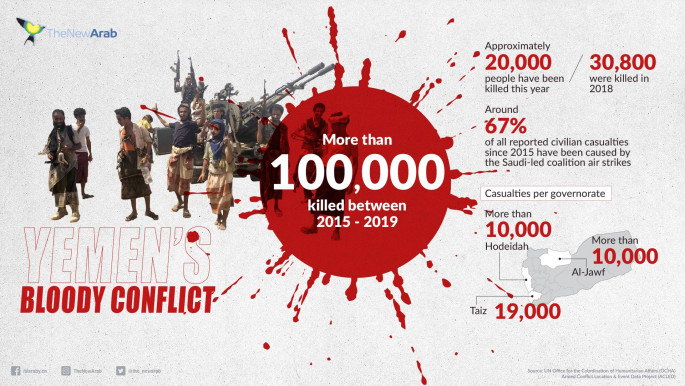Yemen government and UAE-backed southern separatists sign unity government agreement
According to an anonymous source inside the Saudi-led coalition, the two parties have agreed to finalise the the deal that will see a new government formed within a week.
"All the necessary arrangements have been fulfilled to implement the mechanism to accelerate the Riyadh Agreement as of today," the source said on Thursday, according to state-led Saudi Press Agency.
He explained that "there was agreement between the political components to form the Yemeni government of 24 ministers, including the ministers of the Southern Transitional Council (STC)".
The source did not specify the breakdown of the government and whether the UAE-backed STC, which seeks an independent South Yemen, will have equal representation in the government, as per the original agreement.
"The formed government will be announced as soon as the implementation of the military part is completed within a week," the coalition official added.
This announcement of a political breakthrough between the two sides - both officially at war with the Houthi rebels - comes amid increasing public pressure on the Yemeni government and the STC after a record-breaking collapse of the local currency. The Yemeni riyal tumbled to 900 against the US dollar for the first time in history.
Read also: Yemen's UAE-backed STC 'in secret talks with Israel', report claims
Saudi mediators have applied exceptional pressure on Yemeni President Abd Rabbo Mansour Hadi, who is backed by Saudi Arabia, and the STC to declare a unity government, ahead of the start of Joe Biden's term in office.
This will be in conjunction with upscaled efforts to solve the Gulf crisis, anonymous government sources told The New Arab’s Arabic language service Al-Araby Al-Jadeed.
The sources said that a meeting was held in Riyadh on Tuesday night, which included representatives from the Hadi government and the STC - along with Saudi mediators - to decide the names to fill the posts in the unity government.
As part of the unity deal, Hadi was made to walk back on the names he had previously put forward after they were rejected by the STC as well as the Saudi mediators.
The Riyadh Agreement, signed on 5 November 2019, stipulated the creation, within 30 days, of a new 24-member cabinet with equal representation for the southerners.
The internationally-recognised government of Yemen is led by President Hadi, who has been exiled in the Saudi capital since 2015.
|
||
The southern separatists and the government are technically allies in the fight against the Houthi rebels, but the rift between them represents a damaging "war within a war" in the Arabian Peninsula's poorest country.
The STC declared self-rule on 26 April, accusing the government of failing to carry out its duties.
However, on 29 July the STC abandoned their declaration of self-rule and pledged to commit to the implementation of the Riyadh Agreement.
The Riyadh Agreement was initially welcomed as preventing the break-up of Yemen, and hailed as a possible stepping stone towards ending the wider conflict.
The agreement has been broken down into three main components of power sharing: political, military and security.
Political arrangements
The agreement calls for a new government that consists of up to 24 ministers, with cabinet positions being distributed equally between the Hadi government and the STC.
The ministers named must not have a history of encouraging their supporters to participate in clashes with the other side of the conflict.
Yemen’s prime minister must appoint an agreed governor and director of security for Aden, which is the temporary capital of Yemen after Sanaa was taken over by the Houthi rebels.
A governor will also be appointed for the southern provinces of Abyan and Dhale.
All state revenues will be deposited in the central bank of Aden.
Military arrangements
As per the agreement, both STC and government forces that advanced towards Aden, Abyan and Shabwa, the site of numerous deadly clashes are to return to their original posts and to will be replaced by local security forces.
Military and security personnel stationed in Aden will also be re-deployed to different areas under the supervision of the Saudi-led coalition.
The First Presidential Protection Brigade will be excused from the new measures to protect the presidential palace and surrounding areas. The STC leadership will be given the same level of protection.
Security arrangements
The STC forces will be merged into the Hadi government’s interior and defence ministries.
There will also be a re-organisation of security and counter-terrorism forces in Aden, which will include posts from the STC and the Hadi government.
The interior ministry’s director for security will set up a defence force to protect civilian infrastructure.
Follow us on Facebook, Twitter and Instagram to stay connected


![President Pezeshkian has denounced Israel's attacks on Lebanon [Getty]](/sites/default/files/styles/image_684x385/public/2173482924.jpeg?h=a5f2f23a&itok=q3evVtko)



 Follow the Middle East's top stories in English at The New Arab on Google News
Follow the Middle East's top stories in English at The New Arab on Google News


